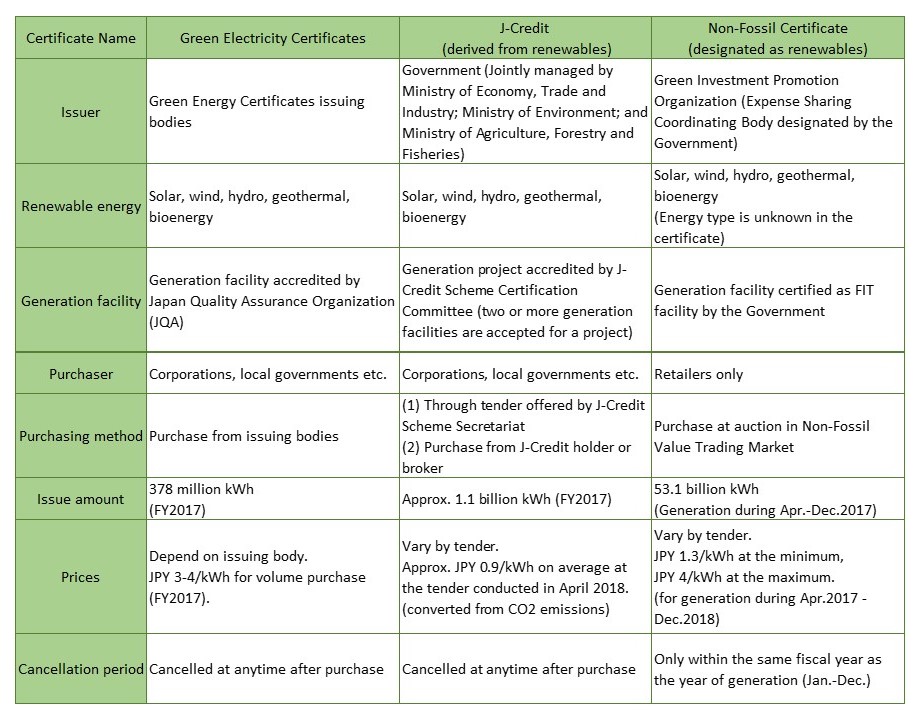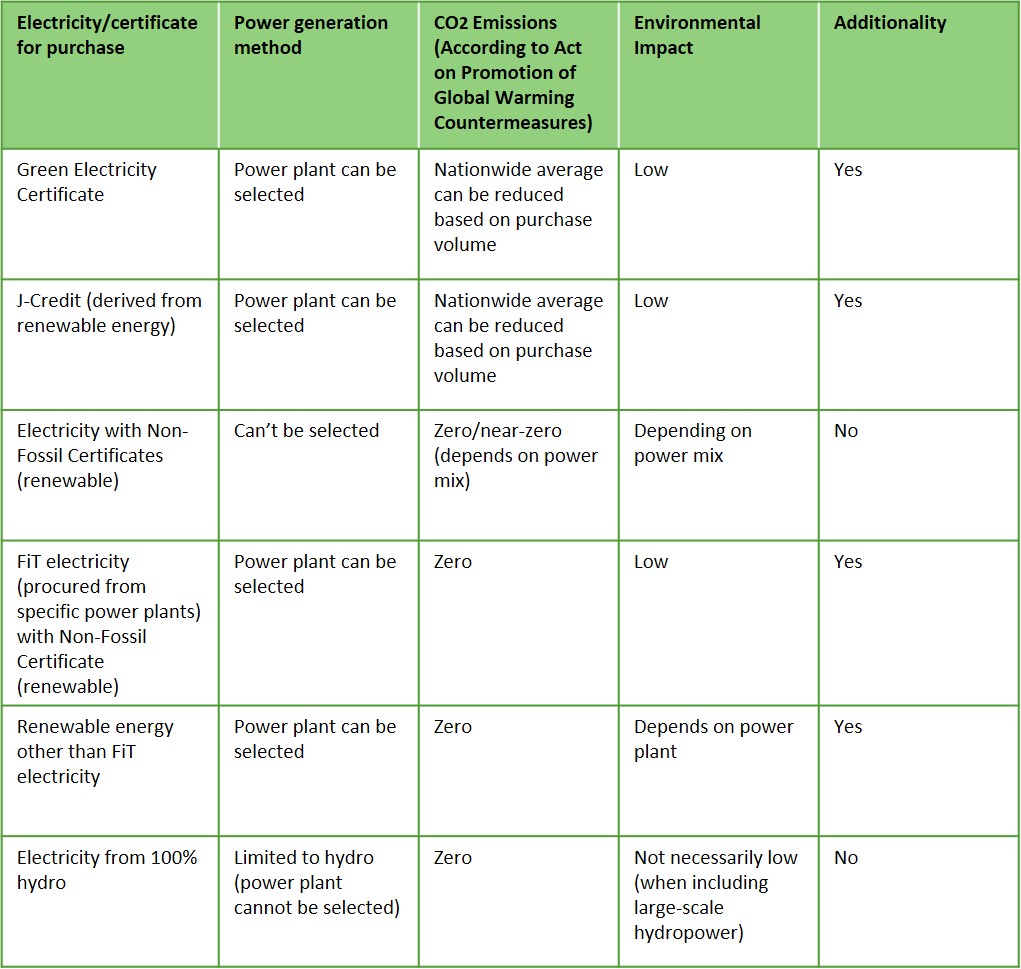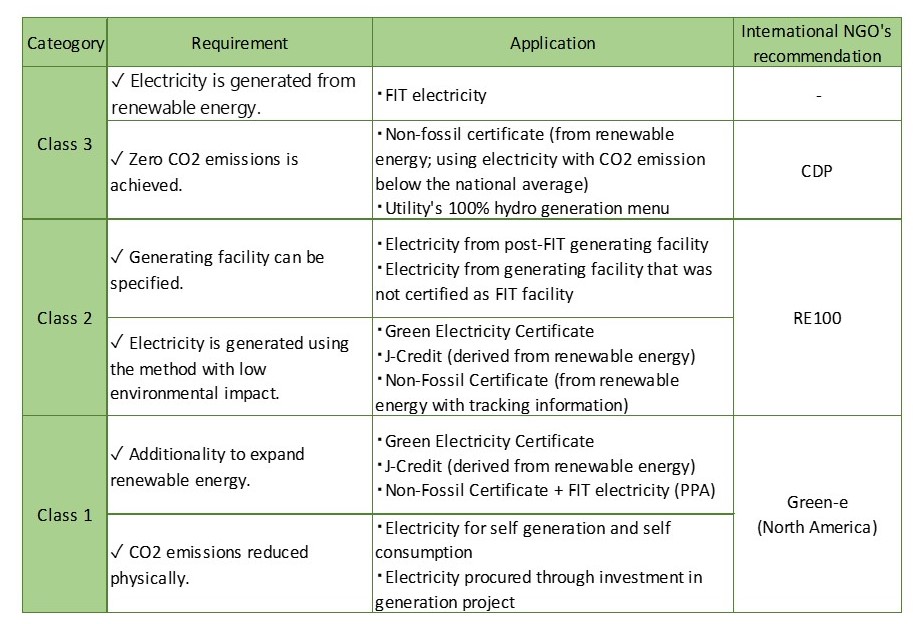Use of renewable electricity to achieve a decarbonized society has continued to gain momentum under the leadership of major corporations. To accommodate their needs, suppliers are rolling out 100% renewable or zero carbon dioxide (CO2) electricity products. In Japan electricity users do not have as many options as in Europe and North America but the increase of new products will accelerate purchase of renewable electricity. There are differences, however, in the environmental impact and additionality. Companies and local governments should select electricity with low environmental impact and high additionality.
Non-Fossil Certificates lacking in Environmental Attributes
There are two categories of electricity products sold as 100% renewable energy. The first combines standard electricity with renewable energy certificates and credits. In Japan three kinds of certificates/credits are available for trading environmental value of low impact and zero-emission derived from renewable electricity (Table 1). Suppliers are able to sell electricity as 100% renewable by combining with environmental value by certifications and credits.

The three kinds of certificates/credits differ with respect to volume, price, accreditation methods, etc. The Green Electricity Certificate and J-Credit (derived from renewable energy) cover power plants that have not been FiT-certified and can be purchased by companies and local governments as well as retailers. The Non-Fossil Certificate (renewable energy category) certifies the environmental value of electricity from FiT-certified power plants (commonly known as FiT electricity) and can only be purchased by registered suppliers. The volume of Non-Fossil Certificates is by far the most. As for price, J-Credit (derived from renewable energy) is the least expensive, and Green Electricity Certificates are the most expensive.
For companies and local governments to increase electricity with low environmental impact, environmental attributes of the certificates/credits are key criteria. If the power plant generating electricity cannot be identified, the environmental impact may not necessarily be low even if the electricity has been certified as renewable. For example, bioenergy plants using fuel with negative impacts on agriculture and forestry need to be excluded.
A problem of Non-Fossil Certificate by FiT electricity is lacking in information of power plant and other environmental attributes. Green Electricity Certificate and J-Credit can be purchased by selecting power plants, but Non-Fossil Certificates are traded without even knowing generation method such as solar or wind. Electricity users cannot verify the environmental impact of the certificates.
The RE100, an international initiative promoting use of 100% renewable energy by corporations, recommends purchasing renewable electricity by identifying power plants. The organization of RE100 has a policy of not recommendingNon-Fossil Certificates by FiT electricity because of lack of information on environmental attributes. Green Electricity Certificate and J-Credit meet the RE100’s criteria so that member companies can utilize.
Even companies and local governments which are not members of RE100 are inevitably hesitant to purchase electricity with Non-Fossil Certificates. In order to effectively utilize Non-Fossil Certificates, information on environmental attributes should be added. The Agency for Natural Resources and Energy, which is responsible for the design of Non-Fossil Certificate scheme, needs to make these improvements as soon as possible.
From the standpoint of environmental impact, attention is required even for Green Electricity Certificates or J-Credit. In case electricity primarily from coal power with high CO2 emissions is procured and provided with certificates or credits, it is undesirable from the perspective of climate change. Electricity with low CO2 emissions should be selected. In case of Non-Fossil Certificates, the optimal method is combining FiT electricity.
Products from Post-FiT Power Plants and Hydropower
The other category of 100% renewable electricity does not use certificates or credits. The electricity is supplied from renewable energy power plants without FiT certification. If the environmental value is retained, CO2 emissions can be calculated at zero. At present, there are products providing electricity from power plants completed FiT (post-FiT) or from hydro power plants (Table 2).

Electricity from post-FiT power plants can be purchased, unlike FiT electricity, with environmental value from renewable energy. Minna-denryoku, a registered retailer, procures electricity from three post=FiT wind power plants in Aomori Prefecture and supplies it to Marui Group, a major consumer product retailer, from September 2018. Marui Group is a member of RE100 and purchases renewable electricity from power plants identified.
From November 2019, a considerable number of post-FiT residential solar power facilities will increase. Registered retailers will procure the electricity and sell it as 100% renewable product. Electricity from post-FiT solar power facilities is expected to supply at low rates.
At the same time, electricity from 100% hydro power is sold by TEPCO Energy Partners and Kansai Electric Power. Many of the applicable hydro power plants are large-scale and have been operating for many years. Large hydro power plants are considered to have a high environmental impact when they were built, so several companies exclude it from the scope of renewable energy.
From the standpoint of climate change, it is also important to consider additionality along with environmental impact. Additionality is recognized when purchasing renewable electricity promotes investment in new facilities. Typically, new power plants in the investment recovery phase or older power plants to be upgraded can claim additionality.
On this point, it would be difficult to recognize additionality for older hydro power plants unless facilities are upgraded and the output increased. For post-FiT power plants, additionality is usually recognized because electricity needs to be purchased for continuing the operation.
Companies and local governments should verify environmental impact and additionality when purchasing renewable electricity. In Japan there is no unified standards for judging environmental impact or additionality, however it is possible to make judgments by comparing with criteria by major international initiatives (Table 3).

The best case is purchasing electricity with low environmental impact and additionality (Class 1 in Table 3). It complies with Green-e, a standard label of renewable electricity in North America. Leading companies in the U.S., including Apple, select renewable electricity complied with Green-e requirements.
Currently in Japan, with stricter requirements, the availability of renewable electricity is limited. In many cases it requires higher cost. In order to improve the current situation, Non-Fossil Certificates from FiT electricity should carry environmental attribute information as the volume of certificates is enormous. In addition, the price of Non-Fossil Certificates should be lowered as the minimum price is currently set at JPY1.3/kilowatt hour.
<Related Links>
Renewable Electricity Procurement Guidebook
for Corporations and Local Governments (2nd edition)
(10 April 2019, Japanese version released on 10 January 2019)






